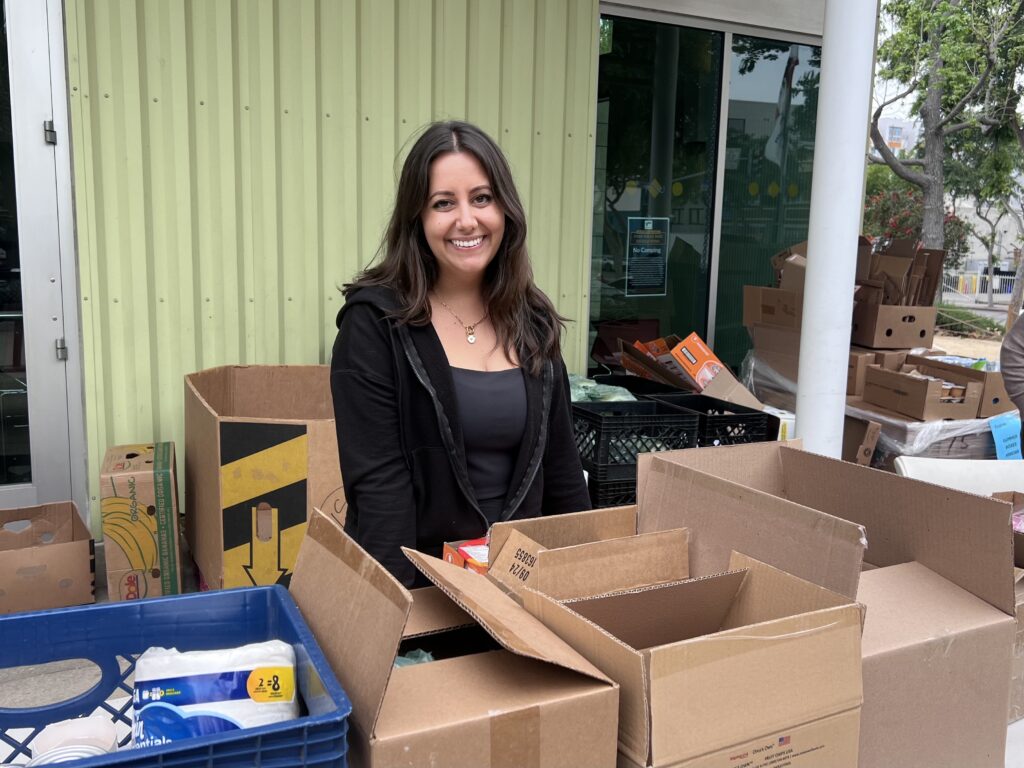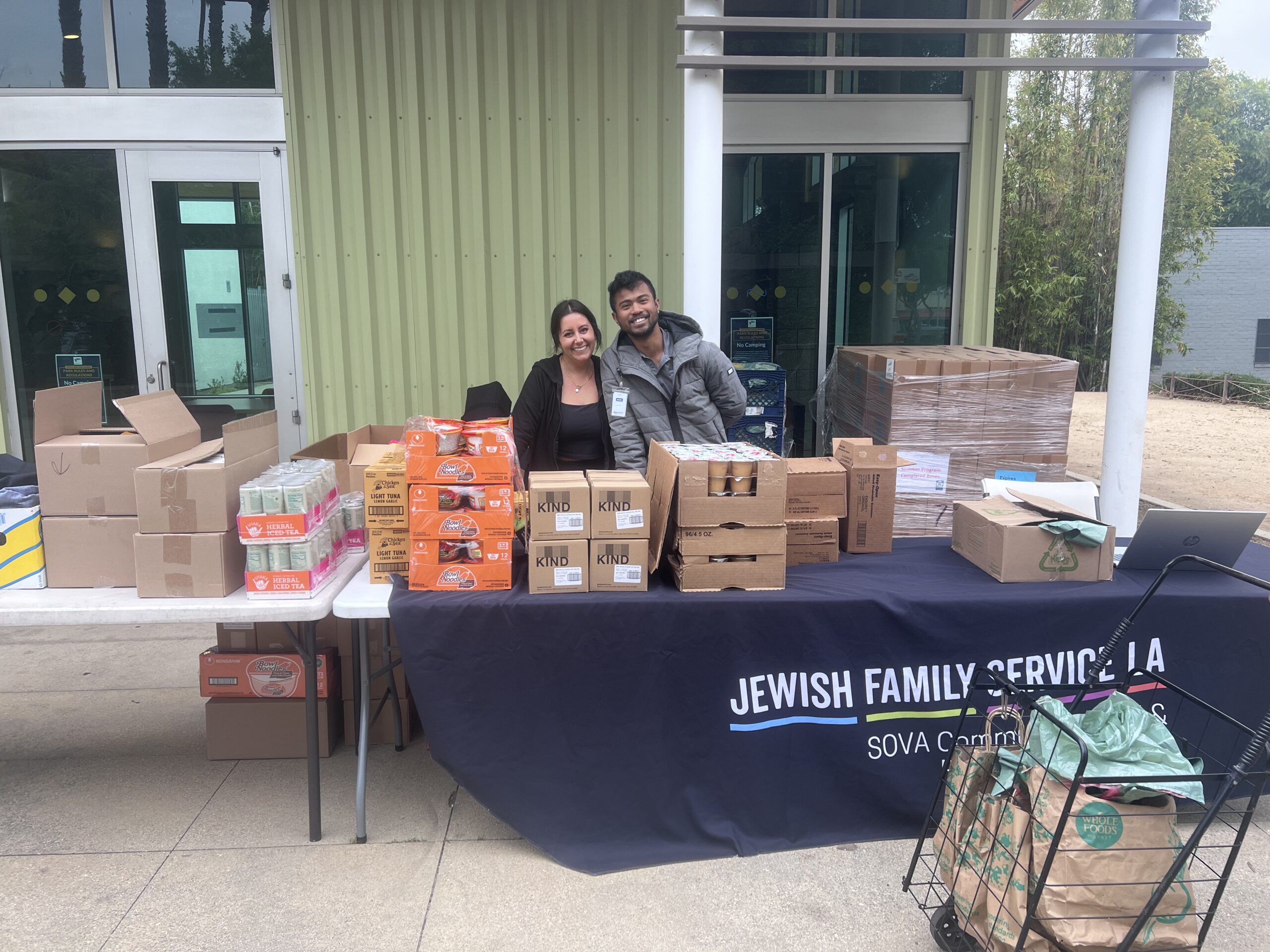Celebrating Volunteerism: Sam Elbaz’s Inspiring Journey with JFSLA

In a city as large and fast-paced as Los Angeles, finding community can be challenging. Those experiencing homelessness face isolation, stigma, and countless other obstacles. While Jewish Family Service LA’s SOVA Community Food & Resource Program operates food pantries across the city, the volunteers and staff at the pop-up pantry at Plummer Park in West Hollywood have created a safe space where unhoused individuals can access food, toiletries, and a community of care. One of the volunteers, Sam Elbaz, has been a driving force behind these efforts, using her time, skills, and compassion to make a tangible difference in the lives of those who come to the pop-up.
Sam began volunteering with JFSLA last year after relocating from San Diego, eager to find meaningful ways to connect with her new city. Volunteering with SOVA, Sam has gone beyond her weekly role of distributing food—she’s cultivated deep relationships with the people she serves and has become a strong advocate for addressing their unmet needs.
Early on, Sam noticed that clothing was a significant need among the unhoused visitors. Some clients would arrive barefoot. Moved by this reality, Sam began organizing weekly clothing drives, reaching out to her friends, family, and social media networks to source specific items. Her approach is personal—she pays attention to each individual’s unique needs, including health considerations or clothing necessities, ensuring the support provided is not just helpful but thoughtful.

“One of our recipients was having difficulty with standard socks, so I got her diabetic socks,” Sam shared. “Sometimes, people show up barefoot, so I ask their shoe size and share their needs on my social media story. Then, kind-hearted people offer to donate new or gently used shoes. When I hear someone express a need, I may not always be able to cover the cost myself—but if I can find a practical, affordable solution, I will. Clothing donations are so essential to the unhoused population.”
Another need Sam identified was nutrition—specifically, access to protein. While food boxes include staples like beans and tuna, recipients often need more easily digestible, protein-rich options such as protein drinks and bars—items that are usually expensive. Initially, Sam and fellow volunteers purchased these items themselves. Realizing the need for a more sustainable approach, Sam reached out to her local OrangeTheory Fitness gym with a creative idea: a protein-based donation class and donation drive. The gym embraced the concept, and the event was a success. Gym attendees rallied to support their unhoused neighbors and brought protein-based food items. In addition, the donation drive raised nearly $300 for JFSLA.
As she spent more time at the pop-up, Sam began learning more about the systemic challenges many recipients face. One story that especially resonated with her was Tom’s—a kind, optimistic man who lost his job and housing due to health issues. When the city cleared encampments in downtown LA ahead of the Dodgers parade, Tom lost nearly everything. For him, it felt like starting over from zero.
Wanting to help, Sam connected Tom with the West Hollywood Human Services Commissioner. With their support—and Tom’s persistence—he eventually secured housing. Now thriving and no longer in need of SOVA services, Tom recently invited Sam and the other volunteers to dinner to thank them. For Sam, this was a full-circle moment: a reminder of what’s possible when people are met with support.
Driven by stories like Tom’s, Sam recognized that meaningful, long-term change would require stronger collaboration between local agencies. She began regularly attending the West Hollywood Human Services Commission’s meetings, using public comment as a platform to propose actionable ideas—such as inviting healthcare professionals from organizations like Healthcare in Action to provide onsite medical support, or coordinating with job assistance programs like JVS SoCal to offer services in the park, during the same hours the SOVA pop-up operates.
“When I noticed there wasn’t much direct action, I took it upon myself to reach out to individual agencies,” Sam explained. “I let them know, ‘SOVA is here every Tuesday morning—come see it for yourself.’ Some responded, some didn’t. But Healthcare in Action did. They began showing up and even gave us a direct line to call when someone was in pain, which we’ve used more than once. One of their doctors told me, ‘I’ve never been able to help this many people in one sitting.’ That’s when I realized—we were really onto something. Since then, I’ve continued to connect with city employees and commissioners, encouraging them to come out and witness the work firsthand. And when they do, they understand just how impactful it is.”
With an MBA and a background in public speaking, Sam uses her skills to amplify the voices of those who are often unheard. She’s even delivered written comments from clients who are not able attend meetings themselves. Though not in an official role, she’s become a reliable advocate—building bridges between city leadership and the unhoused community.
Through Sam’s efforts, more people have learned about JFSLA’s mission, and more resources have flowed directly to the people who need them most. She challenges common assumptions about homelessness, advocating for a deeper, more compassionate understanding of the individuals behind the label.
As communities continue to navigate complex social challenges, Sam Elbaz’s work stands as a powerful example of what’s possible when we choose to listen, show up, and help—one person at a time.